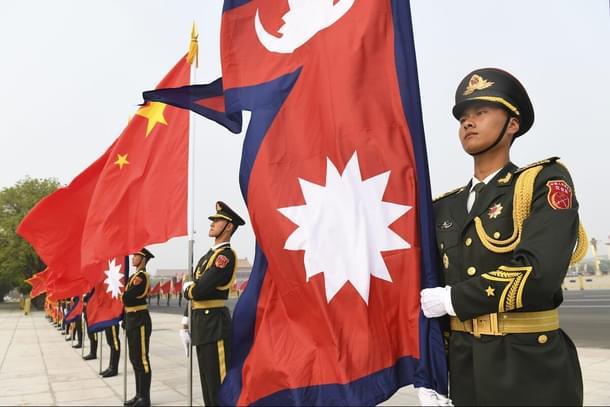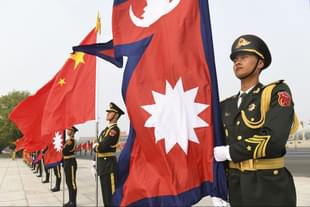Foreign Affairs
Forewarned By India, Nepal Steps Back From China’s Belt And Road Initiative
Jaideep Mazumdar
Jun 28, 2024, 02:04 PM | Updated 02:03 PM IST
Save & read from anywhere!
Bookmark stories for easy access on any device or the Swarajya app.


Nepal has shied away from signing a plan to implement China’s ambitious Belt & Road Initiative (BRI) in the Himalayan nation.
Resisting immense pressure from Beijing, Nepal’s Prime Minister Pushpa Kamal Dahal refused to greenlight the signing during the just-concluded visit of the Chinese Vice Minister for Foreign Affairs, Sun Weidong, to Kathmandu.
Signing the implementation plan would have paved the way for the implementation of nine mega and more than a dozen major BRI projects in Nepal. China and Nepal signed the BRI Framework Agreement in May 2017 and China proposed an implementation plan in early 2020, but Nepal did not agree to the plan.
That’s because soon after Nepal signed the BRI framework agreement in May 2017, India reached out to Nepal’s political leadership, economists, bureaucrats, diplomats, academia, media and civil society leaders to explain the pitfalls of China’s BRI to them.
Thus, by the time China came out with an implementation plan and sent it to Nepal for its approval in early 2020, large sections of Nepal’s top politicians and others had been made fully aware of China’s sinister plan to ensnare nations into a debt trap through the BRI.
When Nepal signed the BRI Framework Agreement with China in May 2017, Dahal was the Prime Minister. But the Dahal government fell in June 2017 and Sher Bahadur Deuba (of the Nepali Congress) succeeded him, thus giving India a good opportunity to mobilise opinion in Nepal against the BRI.
“We launched a massive but silent campaign to educate and inform Nepal’s politicians cutting across party lines, its diplomats, bureaucrats, economists, academia, media and other influential sections of society about the perils of the BRI. Namely, the loans at high interest rates that would have to be taken from China to finance massive infrastructure and other projects which would ultimately become white elephants and would ensnare Nepal in a debt trap,” former diplomat T K Singh told Swarajya.
The outreach was personally monitored by the then-Indian ambassador to Nepal, Manjeev Singh Puri. The examples of other countries which had fallen into the Chinese debt trap were cited.
But the Deuba government fell and China’s stooge, K P Sharma Oli, became the Prime Minister in February 2018. This gave China the opportunity to apply pressure on Nepal once again to commit itself to the BRI by signing the implementation plan.
However, unfortunately for Beijing, the Covid-induced pandemic and its consequent shutdown and social and economic upheavals kept Oli preoccupied for the nearly 3.5 years that he was in power till July 2021. He was succeeded by Nepali Congress’ Deuba who remained in power for the next one and half years.
This 18-month period (of Deuba’s Prime Ministership from July 2021 to December 2022) was judiciously utilised by India to step up the discreet ‘awareness campaign’ against BRI in Nepal.
A diplomatic coup of sorts was achieved when Prime Minister Deuba informed Chinese Foreign Minister Wang Yi in March 2022 that Nepal wants mostly grants, and not loans, from China to finance the BRI projects.
Deuba also told China that Nepal would only agree to a small component of the cost of BRI projects in the form of loans. However, the interest on such loans should not be more than what multilateral lending agencies like the World Bank and Asian Development Bank (ADB) charge for their loans (one per cent per annum).
Nepal wanted concessional loans from China on easy repayment terms and competitive bidding for awarding the contracts for the projects by floating global tenders.
All these were not acceptable to China which charges more than two per cent on the loans it gives to other countries to finance BRI projects. Also, China insists on the contracts for these projects being awarded only to Chinese companies and refuses to do away with or water down penalty clauses (in case of failure to repay the loans on time).
China’s refusal to agree to Nepal’s conditions only reinforced the impression among a large section of Nepal’s politicians that India’s caution about BRI was right.
“The impression that China was trying to ensnare us in a debt trap through BRI projects was reinforced. People of Nepal realised that the massive BRI projects would make Nepal indebted to China in a massive way and China would then leverage that to extract concessions to further its strategic goals,” Nepali Congress MP Gagan Kumar Thapa told Swarajya over the phone from Kathmandu.
Deuba’s letter to Beijing setting conditions also tied the hands of his successor Pushpa Kamal Dahal who became the Prime Minister in December 2022.
“Dahal could not junk the conditions set by Deuba since doing so would have invited charges that he was bartering away Nepal’s interests. Even if Oli becomes the Prime Minister in future, he will not be able to follow China’s wish and do away with the conditions set by Deuba,” Madhu Acharya, former foreign secretary of Nepal, told Swarajya.
Ever since Dahal came to power in December 2022, China has been trying to mobilise opinion in Nepal in favour of the BRI, but with mixed results. Dahal, mindful of public opinion, has refused to play ball.
Frustrated in its efforts to push Kathmandu into signing on the dotted line, Beijing has been holding back on the implementation of other agreements signed with China on enhancing trade and tourism between the two countries and granting various favours to Nepal.
China had wanted Nepal to sign the implementation plan during the three-day visit of its Vice Minister for Foreign Affairs, Sun Weidong, that concluded Wednesday (June 26). The visiting Chinese Minister called on Dahal Monday (June 24), but Dahal remained non-committal.
On Tuesday (June 25), Dahal told lawmakers in parliament that “Our (Nepal’s) priority is grants, not loans. But even if we do take loans, we will not pay interest higher than what we are paying the World Bank and the ADB. We are already burdened with debt and so before taking more loans, we have to think twice. Nepal is mindful of debt traps. We will push the agreement by ensuring that we don’t fall into a debt trap.”
What also worked against China was Nepal’s experience with the Pokhara International Airport which cost US $ 305 million. China’s Exim Bank provided a loan of about US $ 215 million at 2 per cent interest. Chinese firms were awarded contracts for construction and technical works.
Allegations of shoddy construction, inflated costs and mismanagement by the Chinese have fuelled public anger against China in Nepal. The airport has turned into a huge liability (read this) since no commercial and scheduled flights are operating from there.
Nepal wants the $215 million loan converted to a grant amidst fears that it will default on repayment that is scheduled to start in 2026. However, China has refused to consider Nepal’s request.
China’s refusal triggered fears in Nepal that Pokhara could turn into Nepal’s Hambantota (the port in Sri Lanka that China took over when Sri Lanka failed to repay the huge loan taken for its construction).
“Many people are very worried that China will take over Pokhara airport and will then station its troops and Air Force fighters there, thus compromising Nepal’s sovereignty,” said senior Nepali journalist Arun Poudel.
A senior bureaucrat in Nepal’s PMO told Swarajya that his country would not accept China’s terms for operationalising the BRI agreement. “We have set the conditions — at least 70 per cent to 80 per cent of the cost of BRI projects should be in the form of grants, rate of interest on loans should not exceed 1 per cent, terms of repayment should be liberal without stiff penalty clauses, and that there should be open global tenders and competitive bidding for the projects. We will not compromise on these conditions,” he said.
This determination is reflected in Dahal’s refusal to greenlight a draft of the BRI implementation plan (titled ‘Implementation Plan on Jointly Building The Belt & Road Initiative Between The People’s Republic of China and The Government of Nepal’) that was forwarded to the PMO for final approval last week.
“This draft was prepared by the Chinese side and after minor alterations made by the National Planning Commission in consultation with some ministries, it was forwarded by the Ministry of Foreign Affairs to the PMO,” said the bureaucrat.
In fact, Nepal’s Ministry of Foreign Affairs was pushing for the approval of the BRI implementation plan by Dahal. Foreign Secretary Sewa Lamsal wrote to the PMO urging that the plan be approved since the “Ministry of Foreign Affairs had received positive feedback and consensus” from the ministries of finance, law, justice and parliamentary affairs.
Dahal resisted all the pressure since he was aware that accepting the BRI without the conditions formulated by his predecessor (Deuba) would lead to devastating consequences not only for Nepal but also for his political career.
With Nepal setting these conditions which Beijing is unwilling to consider, the fate of the Chinese President’s flagship BRI projects in Nepal is uncertain. All thanks to India which cautioned Nepal about the perils of BRI.





